Swizz Beatz's guide to AlUla, Saudi Arabia
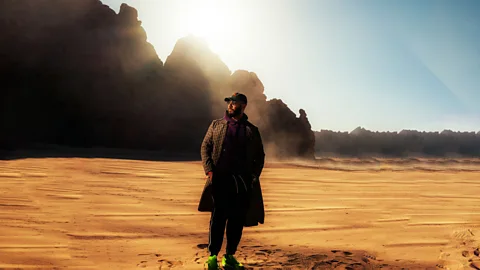 Raul Sosa Jr
Raul Sosa JrLong closed to the outside world, this ancient city is now revealing its secrets. From hot air ballooning to stargazing, here are Swizz Beatz's picks in one of his favourite places.
Throughout his 25-year career, the celebrity – whose real name is Kasseem Daoud Dean – has worn many hats: entertainer, DJ, producer, art buyer, fashion designer and husband to fellow musician Alicia Keys.
And in 2020, the Bronx-born Dean made history as the first American owner of a Saudi Arabian camel racing team.
The move may have surprised fans, but anyone close to Dean knows about his decades-long love for Saudi Arabia – a passion inherited from his grandfather, who completed the pilgrimage to the holy city of Mecca in 1978. The Grammy winner himself is a practicing Muslim and visits the kingdom regularly.
"It was nowhere near as developed as it is today," he says, recalling his first visit in 2006. "But you can feel the energy. You can feel the culture, you can feel the craft."
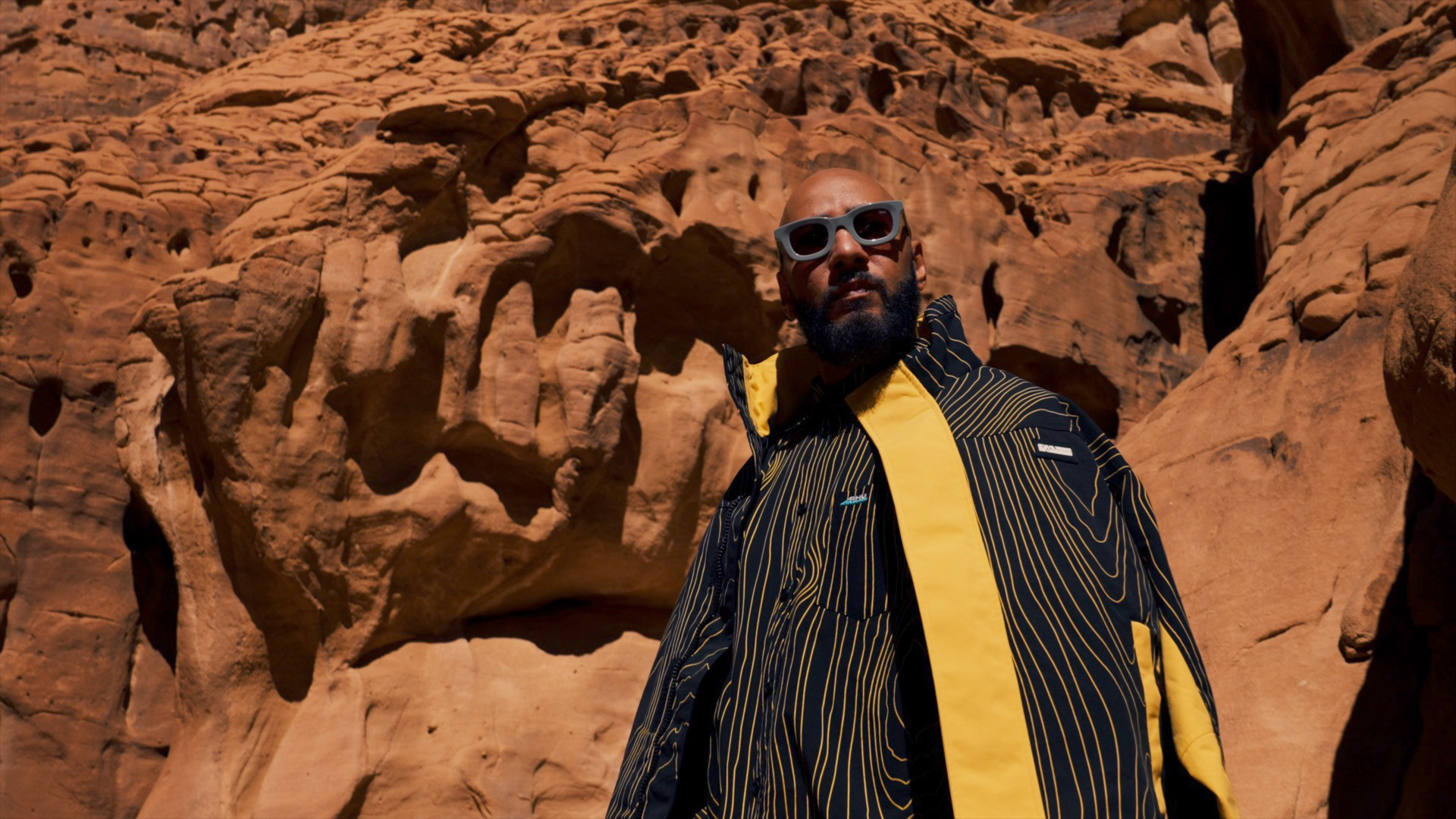
The SpeciaList
Swizz Beatz is an American entertainer, DJ and record producer. He helms the Saudi-based global creative consultancy company Good Intentions, which helps emerging and world-renowned brands tell their stories.
Dean has travelled all over the nation; lately, most often to the ancient city of AlUla – a dramatic desert valley oasis in north-western Saudi Arabia's Hijaz region that has, until recently, been closed to visitors. Despite being the site of the Unesco-listed Hegra, the secondary hub of the region's ancient Nabataean civilisation, it wasn't until 2019 that the Saudi government began issuing tourist visas for non-religious travel, finally allowing travellers to experience the splendour of AlUla's 900-year-old Old Town and its otherworldly sandstone and granite mountain landscapes, as part of a $1tn Saudi government initiative to revamp tourism throughout the nation.
Dean has been there every step of the way.
"My relationship with AlUla is like seeing a seed planted in the ground and watching a beautiful flower grow," says Dean, who was among the first invited to watch the construction of the city's massive Maraya performance venue – a mirror-clad behemoth rising out of the desert sands – and eco-friendly luxury accommodation resorts like Our Habitas. "Seeing the vision coming to life in front of my eyes has been magical to watch."
Dean has "lost count" of his visits, but "every month is something new. It's amazing to see a place thriving off of innovation, arts, creativity and music".
Along with Keys, Dean has worked tirelessly to improve AlUla's cultural scene; helming and DJing at AlUla on Wheels, an immersive open-air skating rink in the AlJadidah Arts District and cheering on his camel racing team, Saudi Bronx, at the yearly AlUla Cup. "[My] camel racing team is a homage to the desert," he explains. "People [here] know me for camel racing more than my music."
Here are Dean's favourite ways to experience AlUla.
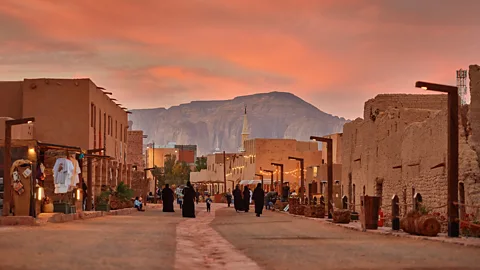 The Royal Commission for AlUla
The Royal Commission for AlUla1. Best place to get a feel of AlUla: The Old Town
In reintroducing itself to the world, AlUla's art galleries now attract international talent and its yearly Wellness Festival features a five-day immersive "sanctuary" retreat and celebrity-led wellness experiences like yoga and sound baths. But to get a real feel for the city, "I would go to the Old Town out the gate," declares Dean. "It gives you the history of AlUla. It's quite a unique area because they're actually rebuilding the entire Old Town."
Wait, camels run?
They certainly do! "It's pretty unique to watch because most people that I speak to never knew camels could run," muses Dean. "They're, like, 'That must be the slowest race ever!' I'm, like, 'No, camels run so fast that we need cars to keep up!'"
Camel racing has often come under fire due to concerns about cruelty to animals and young children, who have historically been used as jockeys. But in recent years in Saudi Arabia, the sport has reinvented itself, now using robot jockeys and providing increasing attention to the animals. "The camel is very sacred," says Dean. "People's love for the camels is just a different level. They get treated very well; they get massages." He laughs. "I wish I could get one."
AlUla's Old Town – a dazzling honeycomb of low-roofed mudbrick buildings – dates to the 12th Century CE, when it was a key settlement on the pilgrimage between Damascus and Mecca. The site, crowned by a 45m-high fortress and hemmed in by 14 gates, was largely abandoned in the 20th Century. Today boutiques, art galleries and cafes have taken over its ancient dwellings.
"When you go there you can see how they build the mud houses, from back in the days until how it's gonna be in the future. You get to see the future of it and still go have a Michelin-star dinner right next door," says Dean. "They're keeping the structures old but with new materials and then, you know, in one of those structures you'll see, like, a Bergdorf." He adds, "It's pretty modern in that sense… It's not like 'damn, I got to take a camel to the store.'"
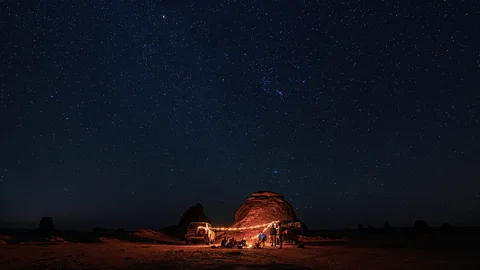 The Royal Commission for AlUla
The Royal Commission for AlUla2. Best cultural experience: glamping in the desert
AlUla, nestled in the vast AlUla Valley, is surrounded by a seemingly endless expanse of swirling red sand dotted by russet-coloured mountains, sand dunes and wadis. At night, its skies are famously pitch black.
"When you go outside at night it's like you can touch the stars from your porch," says Dean. "It almost feels like you're on Mars because the rocks are so big, and you're surrounded by so much gentle strength."
For Dean, "the entire desert experience" – arranged by his go-to luxury resort Our Habitas – makes a great cultural introduction to AlUla. "You're in the tent and you have the Saudi coffee and you have the bread and the food and the herbs and the fire's burning," he says. "Usually, they'll have an oud player. It's amazing. You can sleep out there or just make a dinner reservation. They put on a whole show, fire dancing and dancing to the Arabic music and showing you how to cook local dishes."
Along with desert glamping and dining experiences offered by Our Habitas and Banyan Tree AlUla, wild camping is also possible in AlUla; there are two free authorised camping sites, as well as 10 large-scale campsites including Pangaea Adventure Club. Dressing in layers is recommended, as is safe, responsible camping behaviour, like maintaining a clean campsite and leaving the desert vegetation and wildlife untouched.
"I've never seen the constellations so clear as in AlUla," says Dean. "When I'm in AlUla I can hear myself think. It's an amazing place to go rejuvenate, an amazing place to try new things."
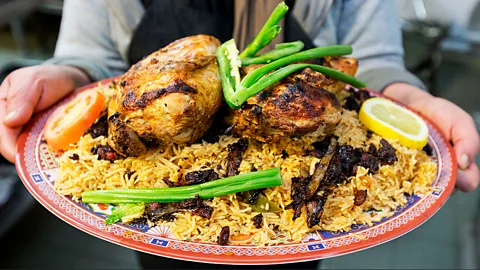 Getty Images
Getty Images3. Best culinary experience: kabsa
With so many new visitors arriving each month, AlUla's food scene now brims with international eateries ranging from sushi bars to hamburger joints. But "of the local foods, [I highly recommend] a kabsa", says Dean – citing a traditional Arabian dish of spiced rice and meat, often chicken, camel, fish or lamb. "It takes a little while to cook but when you get it, it's worth every bite. They cook the lamb very well to where the meat is very [tender]. And they mix it with this rice and it all comes in this pot. You can share with multiple people. The rice has all these herbs and different things in it. Some have different mixes, some are more spicy than others. So tasting multiple kabsas… you're never going to lose with that."
When asked to pick a favourite restaurant in town, Dean is hard-pressed. "You could pick any restaurant. You could pick any hotel. The food is outrageous," he says. "You can tell the people have the passion. I love when a place is so unique that everybody has pride in with it. It's not so rushed. The love is there. The craft is there. What I love about Alula is that the craft is there."
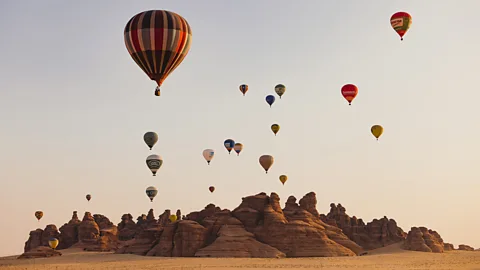 The Royal Commission for AlUla
The Royal Commission for AlUla4. Best outdoor experience: The AlUla Skies Festival
With its stunning mountains and unique rock formations like Elephant Rock, AlUla has a lot to offer outdoor adventurers. But Dean has special love for the AlUla Skies Festival, a spectacular 10-day autumn event celebrating the city's magnificent skies, from stargazing to Dean's favourite, hot air balloon rides.
"That is unbelievable," he says. "I'm not a big fan of hot air balloons. But when I went in AlUla it was just something different. They didn't go too high; I'm a little scared of heights. Ours was at a pretty amazing level where you can go over the Old Town and go over the beautiful landscapes. Seeing where the oasis meets the desert is pretty unique."
During the festival, up to 60 hot air balloons lazily circle the sky in both tethered and untethered flights, taking in the sweeping views of Hegra, the Old Town and the endless expanses of desert sand. Participants can also charter helicopter rides, and for those who'd rather stay closer to the ground, there are meditation sessions and cooking classes under the stars.
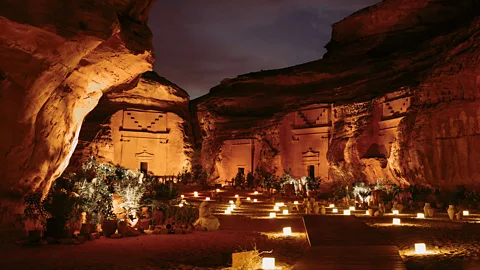 The Royal Commission for AlUla
The Royal Commission for AlUla5. Best place to learn about the past: Hegra
"Hegra is a must, must, must," says Dean.
There are more than 27,000 archaeological sites in AlUla dating to the late prehistoric period (5200-1200 BCE), but Hegra, also known as Mada'in Saleh, is the most well-known. Inhabited since the 1st Century BCE – and a thriving incense and trading hub until the 12th Century – Hegra is the site of a 1.6-hectare necropolis complex containing 111 boulder-cut monumental decorated and inscribed tombs, beautifully preserved by the arid desert conditions. It was named a Unesco World Heritage site in 2008; Saudi Arabia's first World Heritage property.
"You see the structure and the condition and the masterpiece, the masterful architects that built these things way, way, way, way back," says Dean. "It's magical to see."
While in Hegra, visitors can opt for an organised bus tour to the ancient city of Dadan and Jabal Ikmah, a 9th-Century BCE "open-air library" containing the world's largest concentration of Lihyanite and Dadanitic rock inscriptions, or set off on the Oasis Heritage Trail; a 3km palm-tree shaded walking tour through the AlUla Oasis.
"You just have to go to AlUla, period!" says Dean.
BBC Travel's The SpeciaList is a series of guides to popular and emerging destinations around the world, as seen through the eyes of local experts and tastemakers.
--
If you liked this story, sign up for The Essential List newsletter – a handpicked selection of features, videos and can't-miss news, delivered to your inbox twice a week.
